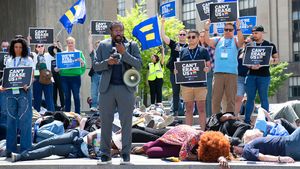A judge has temporarily blocked an executive order from Donald Trump denying gender-affirming care to transgender people in federal prisons.
Keep up with the latest in LGBTQ+ news and politics. Sign up for The Advocate's email newsletter.
Senior District Judge Royce C. Lamberth of the U.S. District Court for the District of Columbia issued a preliminary injunction Tuesday against this denial. This means trans inmates in federal facilities will have access to hormone therapy and social accommodations, such as grooming items, associated with their transition while a lawsuit against this policy proceeds. The injunction does not require federal prisons to provide gender-affirming surgery.
The denial of care was part of Trump’s “two sexes” order issued January 20, the first day of his second term. This section reads, “The Attorney General shall ensure that the Bureau of Prisons revises its policies concerning medical care to be consistent with this order, and shall ensure that no Federal funds are expended for any medical procedure, treatment, or drug for the purpose of conforming an inmate’s appearance to that of the opposite sex.”
In March, two trans men and one trans woman serving sentences in facilities in New Jersey, Minnesota, and Florida filed a class action lawsuit against the Trump administration and the Bureau of Prisons on behalf of approximately 2,000 trans people incarcerated in federal prisons across the U.S. The plaintiffs are represented by the American Civil Liberties Union, its D.C. affiliate, and the Transgender Law Center.
All three plaintiffs were diagnosed with gender dysphoria by Bureau of Prisons medical providers and prescribed hormone therapy by health care staff but either had their treatments suspended or were told they would be suspended soon. The lawsuit argues that this policy violates the prohibition on “cruel and unusual punishment” in the Eighth Amendment to the U.S. Constitution. Federal courts have long held that “cruel and unusual punishment” includes the denial of medically necessary health care, including access to gender-affirming care.
The suit also argues that in implementing the order, the Bureau of Prisons violated the federal Administrative Procedures Act, which bars any U.S. government agency from taking “arbitrary and capricious” action. Lamberth, who was appointed by President Ronald Reagan in 1987, agreed. He said the plaintiffs are likely to win their suit based on this factor, so he issued the injunction blocking the Bureau of Prisons from enforcing this policy while the case continues.
He did not address the constitutional claim. “Because the Court assesses that the plaintiffs are likely to prevail on their APA claims, the Court need not delve into the merits of their Eighth Amendment claims at this time,” he wrote.
Lamberth also granted the plaintiffs’ motion for a class certification and extended injunctive relief to the full class, which encompasses all those who are or will be incarcerated in federal facilities and have a current medical diagnosis of gender dysphoria or who receive that diagnosis in the future. He further dismissed the defendants’ motion to remove Trump as a defendant — he is named in the suit along with other federal officials.
The judge took issue with the administration’s argument that the denial of care to inmates is part of the fight against so-called gender ideology. “By taking hormone medications and accessing social accommodations, the plaintiffs do not seem interested in propagating any particular ‘ideology’; to the contrary, their sworn declarations make clear that they are taking these measures to lessen the personal anguish caused by their gender dysphoria, a benefit on which they have relied for years under the BOP’s longstanding policy of providing this type of care,” he wrote.
The lawyers in the case praised Lamberth’s order. “This is a critical ruling for our clients and all transgender people in Bureau of Prisons custody,” Corene Kendrick, deputy director of the ACLU’s National Prison Project, said in a press release. “This administration’s cruelty towards transgender people disregards their rights under the Constitution. The denial of medically necessary health care, including gender-affirming health care, to people in prison is a violation of their fundamental constitutional rights. We will continue to advocate for the rights of all incarcerated people.”
“Today’s ruling is made possible by the courageous plaintiffs who fought to protect their rights and the rights of transgender people everywhere,” added Shawn Thomas Meerkamper, managing attorney at the Transgender Law Center. “This administration’s continued targeting of transgender people is cruel and threatens the lives of all people. No person — incarcerated or not, transgender or not — should have their rights to medically necessary care denied. We are grateful the court understood that our clients deserve basic dignity and healthcare, and we will continue to fight alongside them.”
“Today’s ruling is an important lifeline for trans people in federal custody,” said Michael Perloff, senior staff attorney at the ACLU of D.C. “The ruling is also a critical reminder to the Trump administration that trans people, like all people, have constitutional rights that don’t simply disappear because the president has decided to wage an ideological battle."
A Bureau of Prisons policy ordering trans women inmates to be moved to men's prisons is under challenge in multiple separate lawsuits.










































































